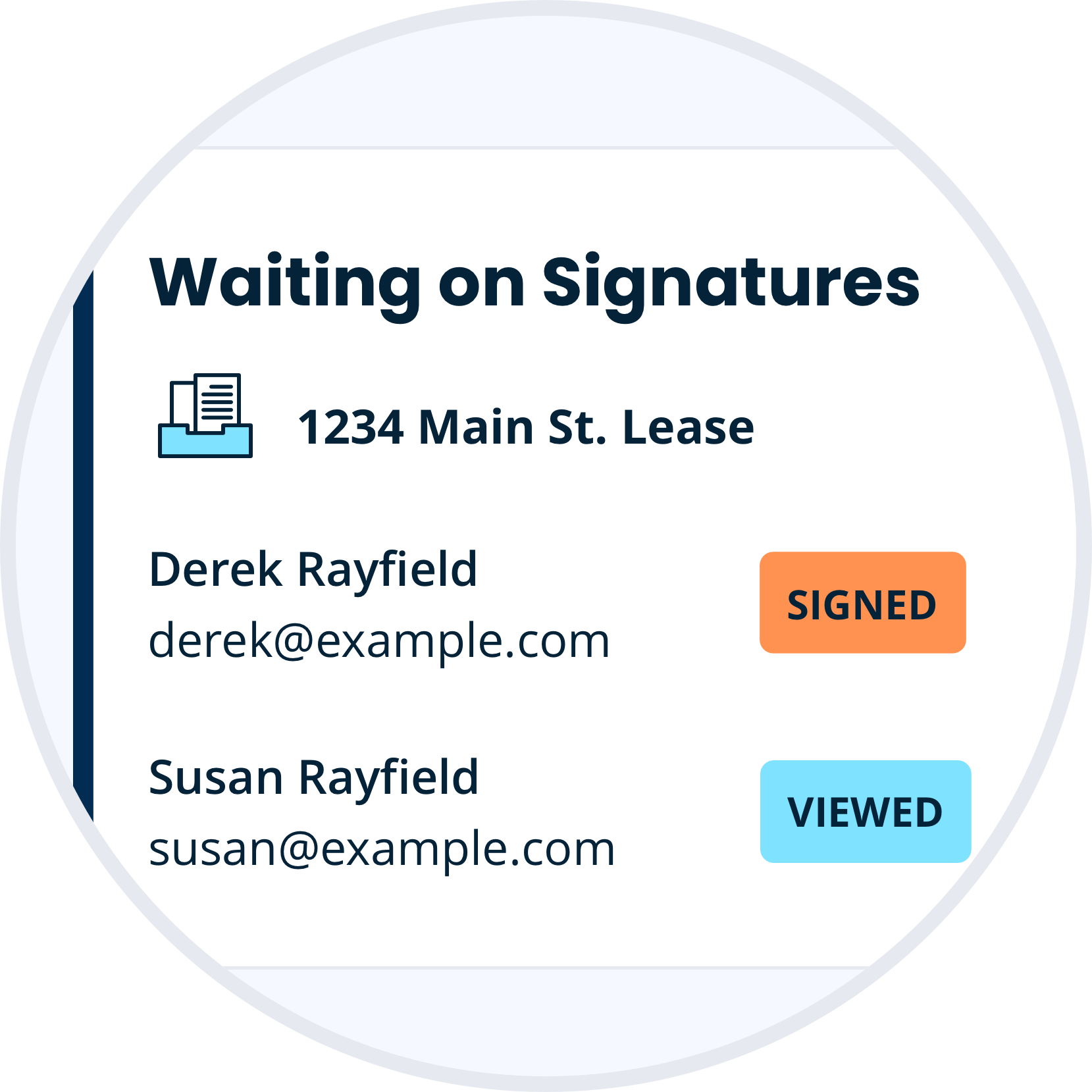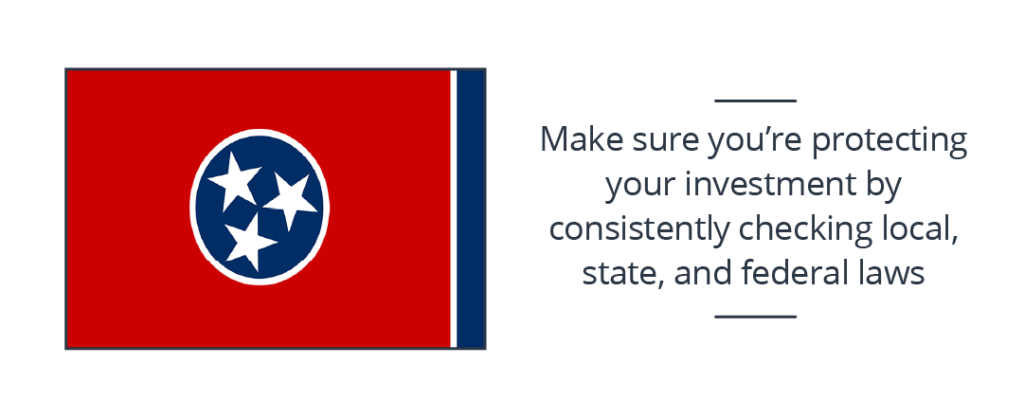Tennessee should be at the top of your list for those looking to relocate or searching for areas to invest in real estate. Those looking to relocate will be thrilled to hear about the high employment rate and low cost of living that the state boasts.
Laws that impact the rental market, landlords, and tenants are constantly being decided in states. Make sure you know what’s on your ballot – find Tennessee voting information.

Tennessee Renters’ Rights and Landlord Responsibilities
- Must return security deposit within 60 days
- No notice required before raising rent
- Must give a 12-hour notice before entering the property
- Required to make repairs within 14 days

When it comes to Tennessee rental laws, there are a few specifics landlords need to know:
- Security Deposit – Tennessee law does not limit the amount a landlord may charge for the security deposit. Landlords must return the deposit within 60 days of the tenant moving out.
- Raising Rent – Landlords in Tennessee may increase the rent to any amount with no notice or justification as long as it is not for discriminatory reasons.
- Notice of Entry – Tennessee does not require any notice before entering the unit or property unless it is in the last 30 days of the lease and they are entering to show the unit. In this case, the landlord must give a 24-hour notice.
- Repairs – Landlords must make repairs within 14 days of a written notice. If a landlord fails to make the repair within this period, the tenant may make the repairs themselves and deduct the cost from future rent payment, or they may withhold rent altogether.
Tennessee Landlords’ Rights and Tenant Responsibilities
- Tenants have five days to pay rent after they receive a written notice
- Must give a 30-day notice before terminating a lease
- Tenants must keep the property clean and free from hazards
- Overdue Rent – If a tenant fails to pay rent on time, the landlord must give them a notice and five days to pay. If the tenant fails to pay, the landlord may file for eviction. If the landlord doesn’t want to give the tenant a chance to pay, they can give them a 14-day notice to pay or quit.
- Terminating a Lease – If a tenant needs to terminate a month-to-month lease, they must give the landlord a 30-day notice.
- Tenant Responsibilities – Tenants are required to keep the property clean and not disturb neighbors.
Tennessee Landlord-Tenant Law FAQ
Below are answers to some of the most commonly-asked questions when it comes to landlord-tenant laws in Tennessee:
Can You Withhold Rent in Tennessee?
Yes, tenants can withhold rent in Tennessee if landlords have failed to fix problems that make habitability hard. Check local laws for any specifications on withholding rent.
How Long Does it Take to Evict a Tenant in Tennessee?
Evicting a tenant in Tennessee typically takes anywhere from four to eight weeks, depending on the reason for eviction.
Is Tennessee a Landlord-Friendly State?
Tennessee is considered a fairly landlord-friendly state because of the lack of rent control laws.
What is the Eviction Process in Tennessee?
There are five reasons a landlord may file for eviction in Tennessee. The five reasons include failure to pay rent, violation of the lease agreement, end of lease term, safety violation, and illegal activity. Depending on the violation, the landlord must give the tenant notice and anywhere from five to 30 days to cure their violation.
If the tenant fails to cure or move out, then the landlord may file a complaint with the court, which costs $139.50. After the complaint is filed, it will be served to the tenant at least six days before the hearing.
If the court rules in favor of the landlord, then a writ of possession will be issued ten days after the ruling. The tenant will have to move out immediately upon being served the writ of possession.
How Much Notice Does a Landlord Have to Give a Tenant to Move Out in Tennessee?
Tennessee does not require a specific amount of notice to tenants when asked to move out. However, 30 days is standard.
Due Diligence and Tennessee Rental Laws
TurboTenant has utilized many municipal sources and official state statutes to compile this information to the best of our ability. However, local laws are constantly in flux, and landlords and tenants alike should do their due diligence and consult legal help when it’s needed. We hope the following list can serve as a valuable resource and allow you to succeed as a landlord or tenant in Tennessee. Be sure to take proper precautions when it comes to finding the top candidates for your unit by utilizing our online rental application and tenant screening services.
Disclaimer: TurboTenant, Inc does not provide legal advice. This material has been prepared for informational purposes only. All users are advised to check all applicable local, state, and federal laws, and consult legal counsel should questions arise.

Unlimited Everything.
Create a single Tennessee lease agreement, or subscribe and receive unlimited lease agreements, landlord forms pack, and e-signs for a simple annual fee. Be confident with all the legal forms and tools you need as a professional landlord.
Discover Our Unlimited PlanTennessee Landlord-Tenant Law Resources
Tennessee Fair Housing Resources
- Local Tenant Rights, Laws, and Protections: Tennessee – HUD
- HUD in Tennessee
- Fair Housing – Tennessee Housing Development Agency and the Tennessee Department of Health
Other State Resources
- Healthy Homes – Renters – Tennessee Department of Health
- Tennessee Housing Codes Healthy Homes Provisions
Tennessee Associations
Tennessee City-Specific Housing Resources
Memphis
Nashville
Knoxville
Chattanooga
- General Housing and Fair Housing – Chattanooga City Code
- Greater Chattanooga Association of REALTORS®
Clarksville
Murfreesboro
Franklin
Jackson
Johnson City
Bartlett
Federal Fair Housing Resources





